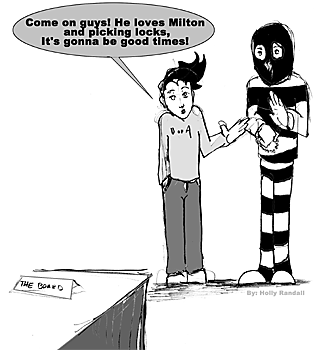
Illustration by Holly Randall
|
|
Arizona Daily Wildcat
Wednesday, November 24, 2004
Print this
In light of the recent disclosure by UA psychology professor Robert Bechtel about his 1955 killing of a fellow classmate, to what extent should the UA accept acts of criminal behavior in prospective employees?
Regents have it right
After hearing the announcement that professor Robert Bechtel at the UA confessed to murdering someone, the whole state seems up in arms trying to figure out how the prevent the state universities from ever hiring a felon again.
But the Arizona Board of Regents was a step ahead of the crowd in calling for stricter hiring practices. In August, they updated their employment policies to include mandatory background checks.
While the new policies do not prevent the state universities from hiring convicted felons, they do make sure that at least the universities will be aware of the criminal records of their employees.
What's best about this current policy is its leniency, which will continue to allow the university to hire people who are talented but still protect the students, staff and faculty at the university.
In other words, ABOR has fulfilled its duty. Its policies are strict enough to prevent some homicidal maniac from going postal on the students, but lenient enough to allow people like Bechtel to bring their firsthand experience into the classroom.
But while ABOR has done its job, the only problem is the state legislature. In order for ABOR's policies to go into effect, the state must pass legislation that would allow the universities to obtain background checks from the FBI.
The ball is no longer in ABOR's or the UA's court; let's stop haranguing them to do something. It's now the state's responsibility.
Laura Keslar is a pre-pharmacy junior. She can be reached at letters@wildcat.arizona.edu.
What are prisons really for?
I believe that not hiring anyone based on their criminal record is entirely against the point of the justice system in this country.
Speaking purely on a basis of the prison system, which happens to be a general form of punishment, aren't convicted criminals supposed to be in jail to learn from their mistakes? It sounds idealistic I know, but isn't that the point?
There are a number of adjustments that freed prisoners face once their "time is up." The No. 1 concern usually is reassimilation into society.
Besides, convicts are more likely to fall back into a pattern of crime if they don't have a legal source of income to provide themselves with shelter and food.
If employers believe that ex-convicts are detrimental to their organization because of past criminal activity, then why not imprison every criminal for life?
The justice system in this country, including laws, courts and prisons, theoretically implies that each person with knowledge of rights and wrongs can work together in society.
As for the UA and their hiring of an ex-convict, it's important they recognize the intent of the justice system. Otherwise, the UA would be entirely hypocritical in their approach toward individuals alienated by society.
It may sound preachy, but the UA must realize that just because you were a criminal doesn't mean you are now, and more importantly that doesn't mean you can't contribute to society anymore.
Lauren Peckler is a sophomore majoring in English and sociology. She can be reached at letters@wildcat.arizona.edu.
Be glad Bechtel got a second chance
Academia has always been a melting pot of so many different types of people. Look at a faculty listing, and you'll see people from all over the world with all different kinds of backgrounds. It's what makes academia what it is.
In other arenas of society, what makes many of the most successful people is overcoming adversity. This usually comes from other people putting them in difficult situations. Think civil rights leaders.
But here at the UA we have an example of someone who created his own adversity. He put his entire life in a tailspin based upon a single decision he made one day while young. But he worked through it, ultimately becoming someone who can talk from such a depth of experience as to surpass even the brightest scholar.
Let's distinguish the decision to allow him to be a professor from the decision to hire him as a professor. Assume he served his entire term. If he presents no present danger to students, isn't it possible that he adds a significant amount to the learning experience?
Granted, precautions must be taken to assure that universities don't let in dangerous criminals. But why set a blanket policy? Bechtel got a second chance, and students benefited. If there's another applicant to be a professor that has a reformed life after committing a crime, we should not automatically reject them.
Ryan Johnson is an economics and international studies junior. He can be reached at letters@wildcat.arizona.edu.
Don't hire felons convicted of violence
The Robert Bechtel situation has revealed more than a few things about our school and our society. First of all, it's clear that the UA has not looked deep enough into the histories of the people that they hire. Otherwise, they would have been aware of Bechtel's shooting - things like a murder conviction along with time on death row and in an insane asylum tend to stand out on a resume.
However, Bechtel's life is proof that a man can make a mistake, go through the government's justice system and still go on to lead a good and productive life. We are a society of second chances, and Bechtel shows us that a man can turn his life around for the better.
But there is the glaring question of classroom safety. No matter what the situation, it's hard to guarantee that a felon who was convicted of a violent crime won't be a risk to the students and faculty. And no one wants a convicted killer or rapist to endanger students. However, it's clear that Bechtel is not really a threat - we have nearly three decades worth of trouble-free employment that show this.
Ideally, the university would be able to look deeply into the background of every person they hire; that way they could discern between those people convicted of felonies who actually pose a risk from those who do not. However, no one at the university who would want to risk hiring someone with a record of violence - they would be held responsible if anything were to happen.
Realistically, the simplest guarantee that a person convicted of a violent crime would not pose a threat would be to simply not hire them.
Brett Berry is a regional development senior. He can be reached at letters@wildcat.arizona.edu.
Don't let past deter UA from good teachers
 |
|
Susan Bonicillo
Opinions editor
|
|
|
These days teachers are hard to come by; qualified and first-rate teachers even more so. Taking into account that the amount of educators in America is not making any gains, it would behoove any academic institution to get rid of barriers that keep good teachers from being hired. One of these barriers that does present a problem in getting the best qualified teachers for the job is that of blindly rejecting applicants based on their records.
The UA has had on its staff since 1976 an admitted killer. Yet, since the 1955 killing, Bechtel has lived in a peaceful manner, raised a family and provided his expertise in the field of environmental psychology at the UA for more than two decades.
Bechtel's life is testimony to the fact that people who have committed crimes do not necessarily go back to criminal behavior.
Legislation this year has the UA and other academic institutions in the state perform mandatory background checks on prospective employees. Such precautions should be taken since we should be aware of the kinds of people who will be working among youth. However, it should also be noted that there are many criminal acts, violent or non-violent, that people can commit. To discount indiscriminately because of an infraction done in one's youth can deprive students of being instructed by someone whose knowledge vastly outweighs the sins of their past.
On the other hand, those with a violent criminal record should be looked at with care. However, as we can see from professor Betchel's career at the UA, even those with a violent past are capable of reform.
Susan Bonicillo is a junior majoring in English. She can be reached at letters@wildcat.arizona.edu.
What extent of criminal behavior should the UA allow when hiring employees?
In lieu of professor Bechtel's recent disclosure about murder to the public, many questions have arisen concerning what types of criminal actions the UA should allow for a person to have on his or her record when being hired.
The UA should loosen up their policies where every individual, no matter of what past criminal convictions, would be allowed to apply and have a chance for receiving a job. Of course it would be somewhat difficult to give a job preference to a multiple murderer over a person who has a spotless record, but it should essentially come down to who has the better qualifications.
If an ex-convict has done the punishment for his crime and has actually taken the time to acquire all the necessary requirements to be considered for a UA job, chances are rather high that he has been reformed. We must all recall the 2002 blockbuster "A Walk To Remember," where Mandy Moore says, "But Daddy, what about forgiveness?" Damn straight, what about forgiveness? These criminals have done their time, paid their dues and probably some unnecessary dues in the prison showers.
Let ex-convicts at least have the chance to make something out of their life and provide the students of America some insightful learning. Ex-convicts are an untapped source of knowledge, and probably have the most depth when it comes to certain subjects. For example, if an individual has been convicted of embezzlement or grand theft larceny, maybe they should teach some law classes. They can show students the tricks that criminals use on the stand and what to look for in specific cases.
Ex-convicts are people too, and some of them are actually smart. Instead of keeping them segregated in an abyss of sewage, bring them into the UA and let them bestow their wisdom upon us.
Moe Naqvi is a physiological sciences freshman. He can be reached at letters@wildcat.arizona.edu.
